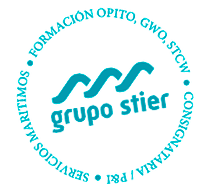Maritime training
Maritime training is regulated worldwide by the IMO (International Maritime Organisation) whose Regulations are approved by the Member Countries and put into practice in each country by the corresponding Administration.
In Spain, this function falls to the Directorate General of the Merchant Navy (DGMM) whose Maritime Authorities are responsible for inspecting, accrediting and controlling the Maritime Training Centres that operate in their port and area.
In order to regularise and unify maritime knowledge and terminology worldwide, in 1978 the IMO established the “International Convention on Standards of Training, Certification and Watchkeeping for Seafarers” whose latest revision is known as “STCW Manila 2010” which provided for the worldwide unification of maritime training on the basis of the IMO Model Courses.
The acronym STCW stands for ”Standards of Training, Certification and Watchkeeping” which is the certification that precisely qualifies in the training standards on board.
In order to better assimilate the contents, STCW Training is divided into:
Grupo Stier, Stier Training Centre, has the approval of the DGMM and Capitanía Marítima de Las Palmas for the delivery of STCW training in Spain. It also has the Homologation of the Maritime Authorities of Dominica Island, recognised by the Commonwealth, to provide STCW Training under international accreditation, which is offered in hybrid mode (online theory and practical training in our Centre) and in English language.
It is the only centre in Gran Canaria with its own facilities in which students can carry out all their courses and practical training in a safe and secure environment:
STCW Certificates are valid for five years after which they are renewed with refresher courses.
Added value: Grupo Stier supports and endorses the training given at our Centre, facilitating the incorporation of our students into the labour market thanks to the exchange of information and contacts that we maintain with the local, national and international maritime port sector through the provision of our maritime services.
Professional maritime qualifications
These qualifications may be in accordance with the STCW Convention or on the basis of other national regulations. They are also differentiated according to the section of the ship (radio, bridge, or engine) and by the level of responsibility on board (management, operational and support); by the limitations of the Gross Tonnage of the ship (GT) and the limitations of distance to the coast or by the zones indicated by the SOLAS Convention (International Convention for the Safety of Life at Sea).
STCW maritime training is aimed at seafarers who can perform duties on merchant ships, while the Higher University Degree is for the Commanding Officers (Engine and Bridge Officers). However, both Masters and other Officers may need STCW Maritime Specialty Courses depending on the type of vessel they sail on, the duties they perform on board and/or the cargo they may carry.
The main advantage of this STCW vocational training is: to facilitate access to jobs at sea to anyone who wants to enhance their profession in the maritime sector whose opportunities can be found in: Fishing and Aquaculture; Maritime Leisure with Excursion Vessels or other public purposes; Harbour Vessels for services to Cruise Ships, Ferries and all types of merchant vessels.

Grupo Stier supports and endorses the training given at our Centre, facilitating the incorporation of our students into the labour market thanks to the exchange of information and contacts that we maintain with the local, national and international maritime port sector through the provision of our maritime services.
